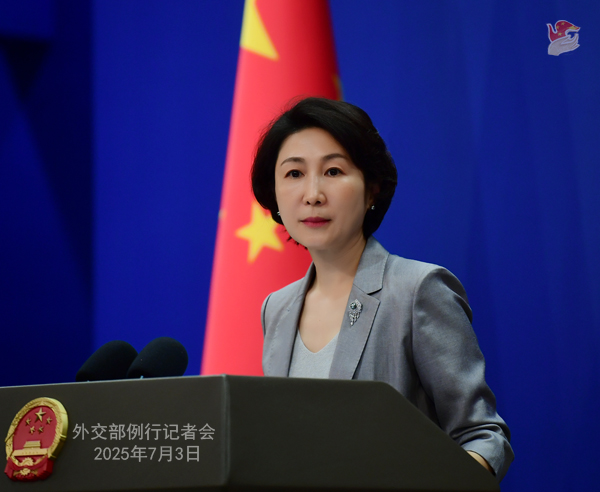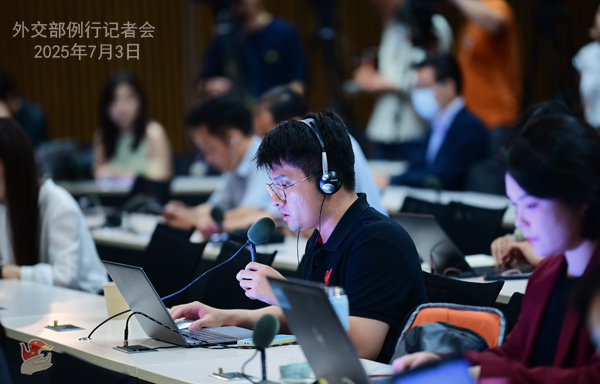
People’s Republic of China


CCTV: Foreign Minister Wang Yi’s ongoing visit to Europe has received international attention. The Foreign Minister made the trip amid the economic and trade tensions between China and the EU. The EU side has recently expressed concerns over several issues in bilateral relations. Could you share with us some details on the visit? How does China view its current relations with the EU?
Mao Ning: In Brussels, Foreign Minister Wang Yi met with President of the European Council António Costa and President of the European Commission Ursula von der Leyen, and held the 13th round of China-EU High-Level Strategic Dialogue with High Representative for Foreign Affairs and Security Policy Kaja Kallas. He also met and had talks with Belgian Prime Minister Bart De Wever and Deputy Prime Minister and Minister of Foreign Affairs, European Affairs and Development Cooperation Maxime Prévot respectively.
Foreign Minister Wang Yi said this year marks the 50th anniversary of the establishment of China-EU diplomatic relations, which is of great significance in building on past achievements and charting the future. The two sides need to take stock of the useful experience and important inspirations of the progress made in China-EU relations over the past 50 years, outline the blueprint of dialogue and cooperation in the next 50 years, and send a clear and positive message. China stands ready to work with the EU to see each other as partners, deepen economic and trade cooperation, open wider to each other, properly handle differences through consultation, and achieve win-win results. In the turbulent and rapidly changing international landscape, as two major players, markets and civilizations in the world, China and the EU need to uphold multilateralism and free trade, safeguard international rules and order, promote the peaceful settlement of international disputes, jointly address climate change and other global challenges, and serve as the “anchor of stability” for the world. China stands ready to strengthen communication and coordination with the EU, make preparations for the next China-EU Summit, and add new substances to and open new prospects for the China-EU comprehensive strategic partnership.
The EU side expressed its commitment to developing a steady and constructive relationship and mutually beneficial economic and trade cooperation with China. Despite differences between the two sides, the EU stands ready to work with China with mutual respect, overcome disagreements, enhance understanding, and jointly address global challenges. It looks forward to joint efforts to make the next EU-China Summit a full success.
We also noted that some people in the EU stick to the Cold-War mentality, choose to believe disinformation, deliberately highlight disagreements, and lack the right perception of China and China-EU ties. This harms China-EU cooperation, and does no good to the EU itself. We hope that the EU will embrace an objective and rational perception of China, practice a more positive and practical China policy and ensure the sound and steady growth of China-EU ties.
AFP: Switzerland’s federal intelligence service warned on Wednesday that the threat from espionage is high in the country and that the greatest threats are from China and Russia. What is the Foreign Ministry’s comment on this?
Mao Ning: Let me stress that in international affairs, China is a staunch force for peace, development, cooperation and win-win. We always believe that mutual benefit is what people want. The so-called threats from Chinese espionage are out of thin air. China is a victim of espionage and firmly opposes espionage. We urge relevant party to stop propagating division and confrontation, fabricating lies, and deliberately smearing others.

Global Times: According to reports, the U.S. House of Representatives recently unanimously adopted the so-called “Taiwan Non-Discrimination Act,” requiring the U.S. government to support China’s Taiwan region in joining the International Monetary Fund (IMF) to gain eligibility for participating in economic surveillance, receiving technical assistance, and employment opportunities within the IMF. What is your comment on it?
Mao Ning: There is but one China in the world, Taiwan is an inalienable part of China’s territory, and the government of the People’s Republic of China is the sole legal government representing the whole of China. Taiwan does not have any ground, reason, or right to join the UN, or any other international organization whose membership is confined to sovereign states. China urges the U.S. to abide by the one-China principle and the three China-U.S. joint communiqués, observe the international law and basic norms of international relations, stop advancing that act, stop using the Taiwan question to interfere in China’s internal affairs, and stop sending wrong signals to the separatist forces for “Taiwan independence.”
Reuters: Malaysian state media reported yesterday citing the country’s Foreign Minister that China and Russia have agreed to become signatories to the Southeast Asia Nuclear Weapon-Free Zone Treaty, while the United States is currently reviewing the treaty before signing. My question is: has China agreed to sign up to this treaty alongside Russia? And if so, why has China made this decision now?
Mao Ning: As ASEAN’s comprehensive strategic partner and friendly neighbor, China firmly supports establishing the Southeast Asia Nuclear Weapon-Free Zone (SEANWFZ). We have said more than once that China is ready to take the lead in signing the Protocol to the SEANWFZ Treaty. We will maintain communication with ASEAN countries on this matter.
Bloomberg: The U.S. and Viet Nam reached a trade agreement and part of that agreement would mean that a 20 percent tariff would be placed on Vietnamese exports to the U.S. and a 40 percent levy would be placed on any goods deemed to be transshipped through the country, so that would affect some Chinese goods that are passed through Viet Nam. Would the Ministry like to comment on this?
Mao Ning: China believes in equal-footed dialogue and consultation as the way to address economic and trade disputes. That said, relevant negotiations and agreements should not target or harm the interests of any third party.



